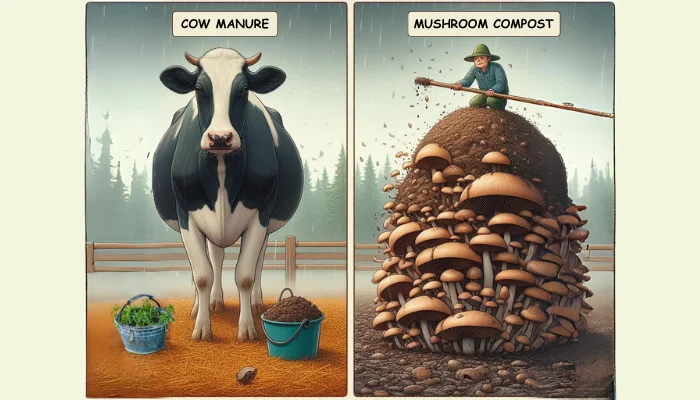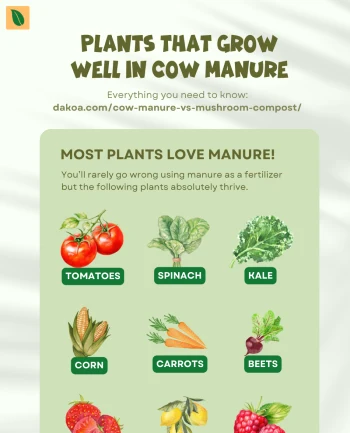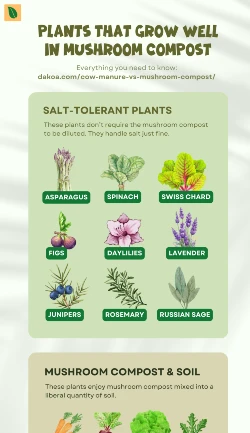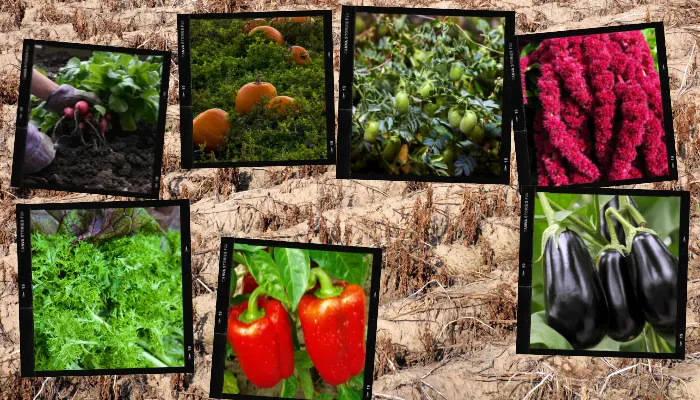Let’s Supercharge Your Garden Soil!
Unlock your garden’s potential with top-notch soil amendments: cow manure and mushroom compost. Dive into the specifics of both, giving you the edge to boost your soil—and your garden. Targeting rich vegetable gardens or vibrant flower beds? The right choice here is crucial.
Soil Health: The Heart of Your Garden
Soil is far from just earth—it’s the backbone of your garden. But, it wears out. Vital organic matter and essential nutrients dwindle, cue cow manure and fresh mushroom compost (we’ll get to whether it should be ‘fresh’ below). Think of them as the ultimate spa treatment for your garden soil, refreshing it with all the essentials for thriving plants. Improved soil structure? Got it. A boost in nutrients? You bet. Time to elevate your garden from good to spectacular.
Cow Manure: Healthy, Nutritious, & Cheap
What’s the Scoop on Cow Poop?
Cow manure, the gardener’s gold, isn’t just any old animal waste—it’s a nutrient-packed powerhouse that can transform your lackluster garden into a fertile paradise. But, hold your horses (or cows, in this case) before you start slinging it around your garden. There’s a method to the madness.
The Must-Do: Aging and Composting
First things first: Fresh cow manure is a no-go directly on your plants. Why? It’s loaded with nitrogen. Great for plants, right? Not so fast. When it’s too concentrated, it can “burn” your plants, leading to all leaf, no fruit scenarios, and even dehydrated, sad-looking plants. The solution? Age it or compost it. This process mellows the nitrogen levels, making it plant-friendly. Plus, composting cranks up the heat, nixing those pesky weed seeds and harmful pathogens lurking in the manure.
Packed with Nutrients
Cow manure is like the multivitamin of soil amendments. It’s brimming with nitrogen (N), phosphorus (P), and potassium (K)—the holy trinity for plant health. Compared to mushroom compost, it generally brings more of these essential nutrients to the party. This means more bang for your buck in terms of soil fertility and plant vigor.
The Perks
- Soil Moisture and Structure: Cow manure isn’t just about nutrients. It’s a soil structure superstar. Adding it to your garden improves moisture retention and drainage, making your soil a cozy, hospitable place for plants to thrive.
- Prevents Nutrient Leaching: You know how sometimes fertilizers just wash away? Not with cow manure. It helps keep those vital nutrients where they belong, in reach of your plants’ roots.
Watch Out for the Cons
- Fresh Manure Risks: We touched on this, but it bears repeating. Fresh cow manure’s high nitrogen content can lead to more harm than good. And then there’s the issue of weed seeds and pathogens—nobody wants those gate-crashing their garden.
- Herbicide Residue: It’s not just about what the cow ate, but what was on what it ate. Some manure can carry herbicides used in feed crops, which can wreak havoc on your garden, stunting growth or even killing plants.
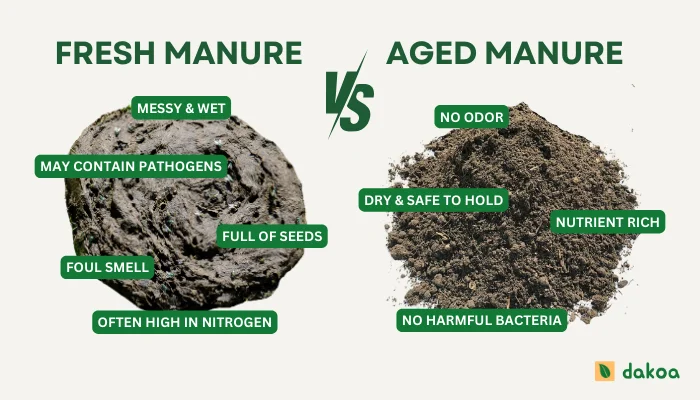
Maximizing Benefits with Cow Manure:
Your Guide to Safe Usage
Navigating the use of cow manure in your garden demands a bit of know-how to ensure you’re harnessing its full potential without the drawbacks. Aging or composting stands out as the go-to method. This crucial step wards off the risk of nitrogen burn and the introduction of unwanted seeds and pathogens, prepping the manure to enrich your soil and bolster plant growth effectively.
Seeking Out the Best Manure
Go with organic, herbicide-free cow manure to minimize the risk of chemical residues contaminating your garden. This choice is essential for maintaining the organic integrity of your vegetable gardens and flower beds, ensuring that your soil amendment promotes healthy soil and robust plant growth without adverse effects.
Incorporation Techniques
Before the planting season begins, integrate aged or composted cow manure with your garden soil. This process creates a nutrient-rich, well-structured foundation, perfect for supporting the diverse needs of your plants. Whether you’re cultivating delicate crops in container plants, managing a perennial bed, or optimizing your garden beds for the growing season, cow manure can significantly improve soil fertility and structure.
Cow manure, when processed correctly through aging or composting, transforms into a garden treasure. Its capacity to enhance soil quality, coupled with its moisture-retention capabilities and nutrient-rich profile, positions it as an elite choice for gardeners aiming to elevate their plant health and garden soil. The success in utilizing cow manure lies in mindful preparation and application, ensuring your garden benefits from this organic material’s full spectrum of advantages.
Cow Manure
Known for its soil-enhancing prowess, cow manure boosts soil structure and injects a rich blend of essential nutrients. However, caution against using it fresh is advised due to its high nitrogen content. The optimal method involves incorporating it into your compost pile, allowing it to age or compost. This process tempers the nitrogen, mitigates the threat of plant burn, and deactivates harmful pathogens and weed seeds.
Mushroom Compost: Dive Into the Benefits
Getting to Know Mushroom Compost
Mushroom compost, the gardener’s choice for enriching garden soil, is loaded with organic material straight from mushroom growers. This “black gold” is perfect for boosting soil quality with its rich organic matter. Despite its excellence, it’s got nuances worth noting for the best use in your vegetable gardens and flower beds.
Managing Its Salty Side
A heads-up about mushroom compost: it’s known for high soluble salt levels. Not a total deal-breaker, but something to navigate carefully, particularly for salt-sensitive plants like azaleas and blueberries. Maturing the compost or blending it can reduce salt levels, making it a viable option for your delicate crop and garden beds.
Nutrient Content: Balanced for Growth
Though not as nutrient-dense as cow manure, mushroom compost holds its ground with a good balance of nitrogen, phosphorus, and potassium (N-P-K). It’s an excellent soil amendment for enriching your soil, offering just the right amount of nutrients for healthy plant growth without overwhelming your plants.
Why It’s a Gardener’s Favorite
- Ease of Use: Its lightweight nature and ease of spreading make mushroom compost a hassle-free choice for enhancing soil’s organic matter, ideal for everything from flower gardens to vegetable gardens.
- Improves Soil Structure: Exceptional at breaking down heavy clay soil and boosting water retention in sandy soil, mushroom compost supports healthy roots and ensures happier, healthier plants across your garden.
- pH Neutral: Its neutrality makes it suitable for a broad spectrum of plants, contributing to the right soil pH and supporting diverse garden soil types without adverse effects.
Points of Caution
- Be Mindful of Salt: The high soluble salt content demands careful use, especially around those plants that struggle with salt. Mature or mix the compost to safeguard your sensitive plants.
- Fungicide Residue Alert: Organic gardening enthusiasts should note the potential for fungicide residues, a byproduct of its origin. Opting for compost from organic mushroom cultivation can mitigate this concern, ensuring a pure, beneficial addition to your soil.
Mushroom Compost
Maximizing Benefits from Mushroom Compost in Your Garden
Leveraging mushroom compost effectively means sidestepping its high soluble salt levels with a few smart strategies:
Blend for Balance
Mixing mushroom compost with your garden’s native soil or adding it to your compost pile can dilute the salt content, making it a friendlier option for a wider variety of plants, including those in your vegetable gardens and flower beds.
Patience Pays Off
Allowing mushroom compost to mature over a few months can naturally lower its salt levels. This patience helps ensure that when you do apply it, your soil amendment won’t overwhelm your delicate crops or salt-sensitive plants.
Strategic Application
Deploy mushroom compost in garden areas less affected by salt. It excels in enhancing soil structure and organic matter content, perfect for robust plant growth in both flower gardens and vegetable patches not occupied by salt-averse species.
Mushroom compost stands out as a superb soil enhancer, offering a gentle nutrient boost and improving soil organic matter without the risk of nutrient overload. Its versatility and ease of use make it an excellent choice for gardeners of all levels. By keeping an eye on the compost’s salt content and matching it to the right plants and soil type, mushroom compost can significantly contribute to achieving a healthy, vibrant garden.
Remember, the success lies in thoughtful application and considering the specific needs of your garden beds, ensuring mushroom compost becomes a key player in your organic fertilization plan.
Comparative Insights: Cow Manure vs. Mushroom Compost for Your Garden
When sizing up soil amendments, cow manure and mushroom compost are top contenders, each bringing unique benefits to the garden soil. Here’s a detailed comparison to guide your choice, aligning with your gardening aspirations.
N-P-K Breakdown: A Nutrient Duel
In gardening, the N-P-K ratio (nitrogen, phosphorus, potassium) is crucial, acting as a soil’s nutrient label. Cow manure, rich in organic material, leads with higher N-P-K averages—think 0.8 nitrogen, 0.5 phosphorus, and 0.5 potassium. This makes it a go-to for those seeking a significant nutrient infusion for their vegetable gardens or flower beds, promoting robust plant growth and soil fertility.
Mushroom compost, sourced from mushroom growers and packed with organic matter like straw and peat moss, offers slightly lower N-P-K numbers: 0.7 for nitrogen, 0.3 for phosphorus, and 0.3 for potassium. While it might not match cow manure’s nutrient heavyweight status, mushroom compost excels in providing a balanced nutrient blend, ideal for gardeners focusing on soil structure improvement and moisture retention without overloading their garden soil with nutrients.
Both cow manure and mushroom compost serve as valuable organic fertilizers, each with its role in enhancing garden soil, from boosting plant health in flower gardens to supporting the growth season of vegetable patches. Whether your garden benefits more from the nutrient-rich profile of cow manure or the balanced, organic fertilization from mushroom compost depends on your specific soil needs, plant types, and gardening goals.
NITROGEN
PHOSPHORUS
POTASSIUM
Manure
0.8
0.5
0.5
Mushroom
0.7
0.3
0.3
MANURE
0.8 – NITROGEN
0.5 – PHOSPHORUS
0.5 – POTASSIUM
MUSHROOM COMPOST
0.7 – NITROGEN
0.3 – PHOSPHORUS
0.3 – POTASSIUM
Application Tips for Optimizing Garden Soil with Organic Amendments
Navigating the use of each soil amendment requires a tailored approach:
Cow Manure
Known for its soil-enhancing prowess, cow manure boosts soil structure and injects a rich blend of essential nutrients. However, caution against using it fresh is advised due to its high nitrogen content. The optimal method involves incorporating it into your compost pile, allowing it to age or compost. This process tempers the nitrogen, mitigates the threat of plant burn, and deactivates harmful pathogens and weed seeds.
Once aged or composted, cow manure becomes an excellent addition to your garden beds, laying the foundation for a thriving planting soil enriched with organic material, ready to support vigorous plant growth throughout the growing season.
Mushroom Compost
Mushroom compost is advantageous for its immediate usability, particularly with plants that thrive in or tolerate higher salt levels. This compost, a byproduct of mushroom growers, offers a straightforward, time-saving soil amendment option, enriching garden soil directly without the need for pre-treatment. Its balanced composition of nitrogen, phosphorus, and potassium enhances soil quality, boosts organic matter, and optimizes moisture retention, making it a versatile choice for diverse garden settings.
Mushroom compost is particularly effective in areas free from salt-sensitive vegetation, where its ability to elevate water retention and improve soil structure without overloading nutrients is most valued.
By following these application strategies, gardeners can maximize the benefits of cow manure and mushroom compost, ensuring their garden soil is rich in organic fertilizers, conducive to healthy plants, and primed for the best results. Whether aiming to enrich vegetable gardens, flower beds, or general garden areas, understanding and applying these organic materials correctly can significantly impact soil health and plant vitality.
Soil Amendments: Pick Your Power-Up
Cow Manure for Enhanced Growth
Packed with essential nutrients and rich in organic matter, cow manure is your go-to for boosting soil fertility and improving structure. Ideal for vegetable gardens and flower beds targeting vigorous plant growth. Opt for composted cow manure to avoid any risks.
Mushroom Compost for Gentle Improvement
For a soft touch that still packs a punch, mushroom compost is your ally. It’s straightforward for soil improvement, great for breaking up clay soil, and enhancing water retention. Let it age to reduce soluble salt levels, making it a smart pick for a variety of plants, including those in flower gardens and perennial beds.
By focusing on your garden’s specific needs—whether it’s the nutrient-rich benefits of cow manure or the balanced, easy-to-use advantages of mushroom compost—you can make an informed decision to bring your garden to life, ensuring healthy soil and thriving plants.
Best Suited for Cow Manure
Vegetables:
- Tomatoes: Benefit from the high nitrogen content, promoting healthy growth and abundant fruit production. Ideal for gardeners aiming for a bountiful harvest.
- Leafy Greens (Spinach, Kale): These nutrient-loving plants thrive in the enriched soil that cow manure provides, enhancing leaf production and overall plant health.
- Corn: As a heavy feeder, corn benefits significantly from the nutrient-rich environment cow manure creates, supporting its growth requirements.
- Root Vegetables (Carrots, Beets): The improved soil structure from cow manure aids in the development of robust root systems, making it easier for these vegetables to thrive.
Fruits:
- Berries (Strawberries, Raspberries): The enhanced soil fertility and structure promote healthier, more productive berry plants.
- Fruit Trees: Young fruit trees can benefit from the nutrient boost and improved soil conditions, supporting their growth and fruit production over time.
Flowers:
- Roses: Known for their high nutrient demands, roses flourish in the rich, well-amended soil that cow manure can provide, leading to vibrant blooms.
- Annuals and Perennials: Many flowering plants benefit from the improved soil fertility and moisture retention, supporting their growth and flowering cycle.
Herbs:
- Culinary Herbs (Basil, Parsley): These herbs appreciate the nutrient boost from cow manure, enhancing their flavor and growth.
Best Suited for Mushroom Compost: Salt-Tolerant Plants Edition
When using mushroom compost, you’ll want to choose plants that can handle higher levels of soluble salts unless you dilute the compost into a nutrient-rich soil. If you do that, you’re giving your garden the best of both worlds, and plants like melons thrive in a nutrient-rich soil bed with some mushroom compost mixed in to retain moisture.
Here’s a list of salt-tolerant plants that handle higher soluble salt levels just fine, so you can use more mushroom compost if you’d like:
Vegetables:
- Asparagus: Known for its salt tolerance, making it a good match for mushroom compost.
- Spinach: Another vegetable that can handle saltier conditions well. Spinach does well in cow manure also. It’s a very forgiving plant!
- Swiss Chard: Tolerates higher salt levels, benefiting from the balanced nutrients in mushroom compost.
Fruits:
- Figs: These trees are more tolerant of salt, making them suitable for areas amended with mushroom compost.
Flowers and Plants:
- Daylilies: Known for their hardiness, including a tolerance for higher salt levels.
- Lavender: Thrives in well-drained soils and can handle the salt content found in mushroom compost.
- Russian Sage: Another plant that tolerates and even thrives in salty conditions.
Shrubs:
- Junipers: These are known for their tolerance to harsh conditions, including higher salt levels in the soil.
- Rosemary: As a Mediterranean herb, rosemary is adapted to thrive in conditions that mimic its native environment, including soils with higher salt content.
Now, this list focuses on plants with a higher tolerance to soluble salts, making them more suitable candidates for areas heavily amended with mushroom compost. But, given how expensive mushroom compost is these days, you’ll likely want to mix it, which dilutes its high salt property, into soil or even add some old-fashioned (and cheap) cow manure!
The following plants do well in soil that’s been mixed with mushroom compost:
Best Suited when Mushroom Compost Is Mixed With Dirt
When you mix mushroom compost into a liberal quantity of garden dirt, you end up with a balanced nutrient profile that’s good for improving soil structure and moisture retention, while lowering the higher than average soluble salt levels from the straight-forward mushroom compost.
Vegetables:
- Root Vegetables (carrots, beets): Appreciate the soil’s improved structure for easier root growth.
- Salad Greens (lettuce, arugula): Benefit from the balanced nutrients and improved moisture retention.
- Peppers: Enjoy the balanced nutrition and moisture that supports robust growth and fruit production.
Fruits:
- Melons: Value the moisture retention for steady growth.
- Apples and Pears (when establishing new trees): The balanced nutrients and improved soil structure support healthy root development.
Flowers:
- Annuals: Many annual flowers appreciate the improved soil conditions without the risk of nutrient burn.
- Bulb Flowers (tulips, daffodils): Benefit from the improved soil structure and mild nutrient content for vibrant blooms.
FAQ: Enhancing Your Garden with Manure and Compost
Q: What are the benefits of using cow dung or even chicken manure in my garden?
A: Cow dung and chicken manure are excellent sources of nutrients for garden soil. They enrich the soil with essential nutrients, improve soil structure, and enhance moisture retention. Both are great choices for organic fertilization, promoting healthy plant growth and soil fertility.
Q: Can I use horse manure and sheep manure in my vegetable garden?
A: Yes, horse, goat, and sheep manure are beneficial for vegetable gardens. They provide a good balance of nutrients and organic matter. However, it’s best to use aged manure to reduce the risk of harmful bacteria and to ensure nutrients are readily available for plant uptake.
Q: How does mushroom compost compare to cow manure for flower beds?
A: Mushroom compost vs cow manure presents a choice between a lighter nutrient mix and a richer one. Mushroom compost is a better option for improving soil structure and moisture without overloading with nutrients, making it suitable for flower beds. Cow manure offers a higher nutrient content, ideal for nutrient-hungry plants.
Q: What is green manure, and how can I use it?
A: Green manure refers to plants grown to be incorporated into the soil as a nutrient-rich organic matter. Sowing green manure like clover or alfalfa and then tilling it into the soil before it matures can significantly improve soil health, making it an effective soil-building medium.
Q: Are there any cons of using cow manure in gardens?
A: While cow manure is highly beneficial, cons include the potential for weed seeds and the need to compost it first to reduce the risk of burning plants with too much nitrogen. It’s also important to source manure free from harmful pathogens and chemicals.
Q: What should I know about the pH level when using mushroom compost?
A: Mushroom compost generally has a neutral pH level, making it versatile for many garden types. However, always test your soil’s pH before adding any amendments to ensure they match your garden’s specific needs.
Q: Can mushroom spawn be used directly in the garden?
A: Mushroom spawn itself isn’t used as a soil amendment. It’s the starter material for growing mushrooms. After mushrooms are harvested, the spent substrate, known as mushroom compost, can be used in gardens.
Q: What’s the best time to apply compost manure to my garden?
A: The best time to apply compost manure is in the early spring before planting, or in the fall after the growing season ends. This allows time for the nutrients to integrate into the soil.
Q: How do I choose the best compost for my garden?
More To Discover
A: The best compost depends on your garden’s needs. Look for compost that is well-aged, free from weed seeds and pathogens, and matches your garden’s nutrient requirements. Consider mixing different types of manure and compost, like cow manure with mushroom compost, for a balanced nutrient profile.
Conclusion
Whether cow manure or mushroom compost is better depends on your garden’s specific needs and ethical considerations: cow manure supports recycling animal waste, while mushroom compost repurposes agricultural byproducts. Test your soil, consider your plants’ needs, and choose accordingly for a healthier garden.







